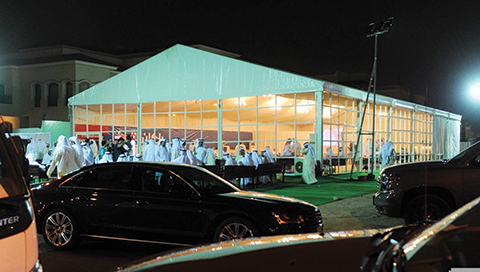 KUWAIT: The electoral headquarters of the candidates standing for the 2016 parliamentary elections are once again shining with lights ahead of the polls slated for November 26, amid a real democratic and competitive atmosphere. It is so quiet and calm at these headquarters during the day, but it is completely lit at night, as they are packed with candidates’ supporters, and others concerned with politics. — KUNA
KUWAIT: The electoral headquarters of the candidates standing for the 2016 parliamentary elections are once again shining with lights ahead of the polls slated for November 26, amid a real democratic and competitive atmosphere. It is so quiet and calm at these headquarters during the day, but it is completely lit at night, as they are packed with candidates’ supporters, and others concerned with politics. — KUNAKUWAIT: With less than a month before the parliamentary elections slated for November 26, candidates, males and females alike, are beating time to come up with attractive ideas to lure their voters. Candidates are running for parliamentary elections for so many reasons, ie prestige, show-off, influence, and there for sure are many who run for the sake of their homeland's prosperity. Running for elections can become a nightmare for some candidates who have nothing to give to their voters, where some make extraordinary promises which cannot be implemented on ground.
Others who fully adhere to their electoral program may not be lucky enough to win the race, whereas many candidates can snatch the seat through their prestige. Experts in the fields of psychology and media have agreed that some candidates may seek influence, tribal linkage, dominance and prestige, whereas others have commitment to their electoral programs and want really to make a change in the society. Dr Saud Al-Ghanim, Professor of Media in Kuwait University told Kuwait News Agency (KUNA) that the candidate may run for elections to satisfy his or her needs such as security, belonging and influence.
Al-Ghanim added that some candidates feel that they have incompetence in some aspects of their lives and want to fulfill, even though many of them are rich enough to "buy an island abroad and live securely with their families but still eye influence". Asked about ways where the candidate can persuade the voters, he said that some candidates are good in rational persuasion and logical thinking, adding that those candidates have documents and proofs that substantiate their opinion, also making it easy for their aides to convince voters to vote for him.
Al-Ghanim said the second method of persuasion is the use of emotions, belonging and family bonds to lure voters, saying that this way is "unacceptable". Asked how the voters can know whether this candidate is serious in implementing his or her program once elected for parliament, he replied by saying that there are many factors the voter can use to determine this matter including the past experience of the candidate, or whether he or she is supported and backed by a certain group or affiliation and most importantly the nature of people around him.
Also asked whether the high pitched tone of the candidate could have an impact on the voter's conviction, Al-Ghanim said that some people become easily affected and persuaded by the high pitch whereas other don't. Dr Fawaz Al-Ajmi, another Media Professor in Kuwait University told KUNA that some candidates contest the election for nothing but influence and prestige and there are others who would really want to do a change. Al-Ajmi added that there are voters who become convinced by the candidate's appearance or look, adding that voters also can judge whether the candidate deserves the parliamentary seat if he or she was an organized person, which in turn the candidate's personality would be reflected on the society.
He pointed out that some candidates believe that it is easy to run for the elections because of the availability of the social media means which have made everything easy, adding that it has now become effortless to become acquainted with the candidate's program and future plans. He noted that the social media outlets have also made it easy for the candidate to run for elections where in the past, the candidates used to visit the voters at their diwaniyahs to disclose their electoral program.
From the psychological perspective, Assistant Professor of Psychology in Kuwait University Dr Naeima Taher said that many candidates run for the elections as they believe they can resolve the country's problems, whereas others believe it is lucrative to be an MP. She added that some candidates believe in the prestige and love to be seen by others in the various media means. She pointed out that the society now is aware of the electoral process and would not be deceived by those who do not want good for the society. - KUNA










